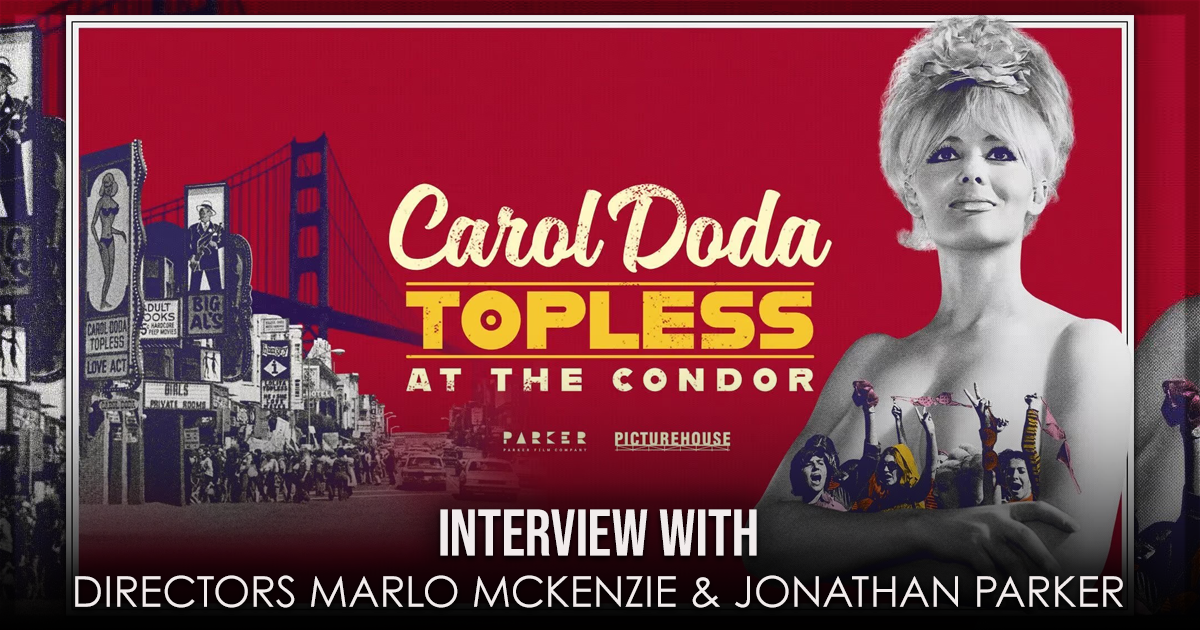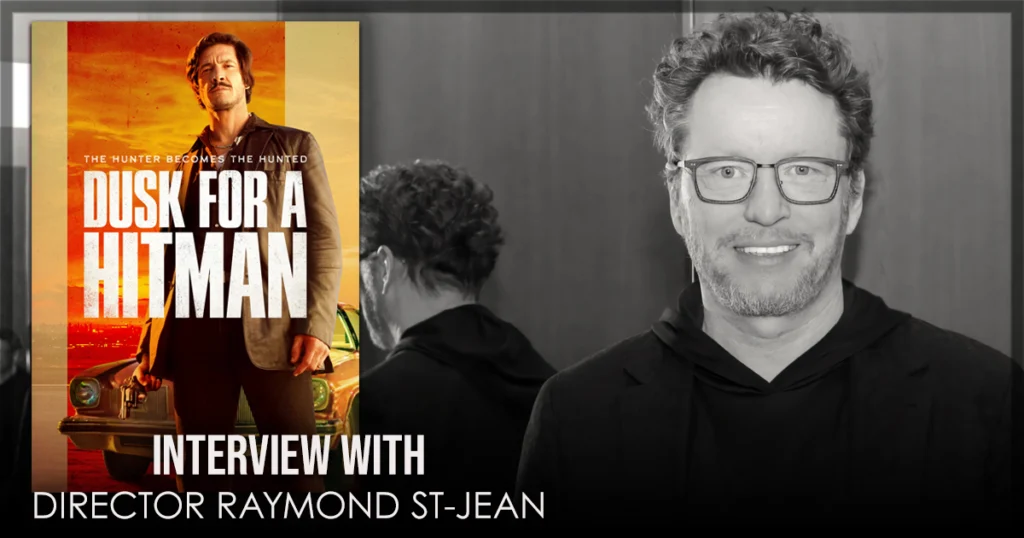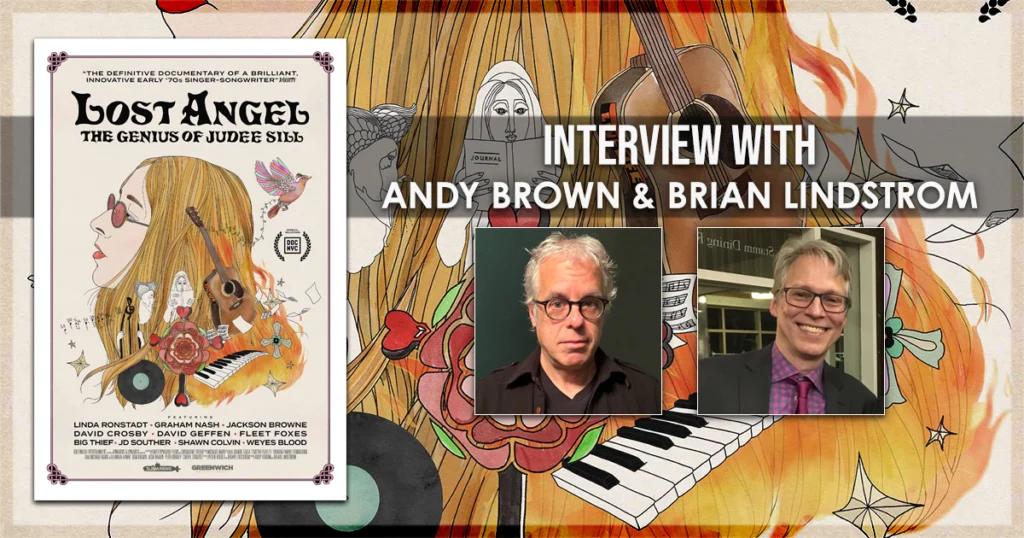With their new documentary Carol Doda Topless at the Condor, directors Marlo McKenzie and Jonathan Parker explore the obscure celebrity of the first woman to ever go topless in a live show. The film covers the atmosphere and tone of the early 60s and Broadway Street in San Francisco. In their first feature-length documentary, I was lucky enough to talk to the pair about Carol’s legacy, topless dancing, having a “villain-less” film, and knowing the real Carol Doda.
The Interview with Marlo McKenzie and Jonathan Parker
[Editor’s Note: This interview has been lightly edited for clarity]
Ben Miller: Thank you so much for joining me. First off, I want to say congratulations on your film. It’s a wonderful experience and a kind of story that a lot of people are unfamiliar with. So congratulations first and foremost. Now correct me if I’m wrong, this is both of your first [feature length] documentary, correct?
Jonathan Parker: Yes.
Marlo McKenzie: Yes.
Ben Miller: The main thing I was thinking about is: since this film covers so many narrative elements, like not just Carol herself, I was curious about how it came about. Was Carol always kind of supposed to be the topic? Or did you want to focus on something else or San Francisco in the area in that time? And then Carol kind of came the main focus. Like what was the journey to this film’s eventual [final product]?
Jonathan Parker: Well, if you want a history on the project itself, it actually started in the late nineties, when Carol opened her lingerie store on union street. My office overlooked this little courtyard where her store was.

And I was like, whoa, Carol Doda! That’s because she was very famous in San Francisco. So, I got to know her and I was an aspiring filmmaker at the time. I started looking into her story and just found it really compelling how her career began with this kind of random confluence of events. And I just pitched to her, making a movie about her life and she was up for it. We worked on it for quite, quite some, some months, probably 6 months or so. And then ultimately, though, it didn’t come together. And I kind of just put all the notes in a file in my office and, and 20 years later, Marlo and I were working on a different project together and she found the file.
Marlo McKenzie: I found the file and as you can imagine, it’s a very interesting thing to discover. You know who Carol Doda was, though, so I did some research and it is immediately…you can tell it’s a special story and it just, it’s amazing. Automatically, you have all of these questions about Carol, and you want to get to know her better. Like, how did she end up being the first to dance topless? Why did she make the decision she made? Who is Carol? And so I, to go back to your earlier question, when Jonathan and I agreed to produce the film, had envisioned it as something that was really focused on Carol, but we did decide…as you go along in documentary, there was more to tell, and the city became a larger part of the story…and music.
Jonathan Parker: Yeah, I mean, I think just to get to your question, I thought it really should be more kind of a life and times thing because the nightclub scene on Broadway at that time is something that San Franciscans now really have no idea about. So it was really nice to be able to remind everybody what San Francisco was like at that at that time.
And that stretch of Broadway is very, very different now. Carol is a focal point and she’s at a place in history and doing certain things that ultimately had a lot of consequences in our culture. And so I think we wanted it to be about her, but more in context with everything that was going on.
On Carol Doda’s role as part of the cultural tipping point between the 50’s and 60’s
Ben Miller: You know, it’s funny because when I was watching, that little sequence about swim dancing, about how you don’t even realize that Carol inadvertently killed swim dancing out of nowhere. It’s not like she’d set out to like destroy it. But like, there’s this little…what is swim dancing? Who did it? What, why this is, connected and then Carol comes in and just kind of blows it out of the water. Did you kind of see this as like, Carol was the tipping point between like the more reserved coming out of the 50’s to the more open of what the 60’s were starting to turn into.
Jonathan Parker: Yeah, I think you could definitely say that. Carol herself, she really wanted to be a nightclub performer in the vein of Frank Sinatra and the kind of Rat Pack era. And she really was not a hippie in any way herself. By dancing topless, it really you can really look at it as a kind of a catalyst as one of multiple things that were going on at that time. The Beatles had just come to America. It was really a moment on the on the…the tipping point I think is a good way to put it.
Ben Miller: So as much as the film is obviously about Carol and this experience in this time and what that kind of means in the shift, but it’s more like a love letter to the specifically that perfect moment in time where San Francisco was this center of entertainment world and it’s funny to look back on it.

Topless dancing. It doesn’t seem like it is a kind of more of a wholesome thing, but it actually did seem kind of wholesome in it’s kind of like the way we think of topless dancing today and the way we thought of topless dancing back then. It’s a chasm of difference. It also speaks to that very specific in between time of our country’s history. Why do you think that was? Do you think that topless dancing could have been like an entertainment thing as for what it was, like, why was that specific time so imperative to everybody’s success?
Marlo McKenzie: Well, I would just say that sort of like what you touched on, there was a lot of repression in the 50s. And so when Carol came along, it was like, children. If you think of adults as children, children finally getting to play and express this, that had been really shrouded in shame and guilt. Religion teaches us in America that it’s a bad thing to have these desires that we have and so to actually suddenly be able to say maybe these desires are okay. And maybe we can just have fun with it and in a space that’s consensual, enjoy this. So it was this innocence in the beginning until, as you see in the movie, it began to change on the street.
Jonathan Parker: Yeah. Yeah. So, you know, the other thing is this was not an act that Carol…it’s not like she just like took off her top one day, she was given a topless bathing suit by a very famous fashion designer. So there were multiple elements in the air at that time. Across the bay at Cal Berkeley, there were freedom of speech demonstrations beginning and which was kind of the catalyst for a lot of civil rights and women’s rights and gay rights. All of a sudden, everything started to change.
On balancing the line between informing and entertaining with the documentary
Ben Miller: One of my favorite things about your film is specifically how I learn so much, but I don’t feel like I’m overwhelmed with information. You very, very briefly, for a two minute scene, being, “Hey, by the way, bra burning, we never burned any.” And then you kind of like go on, like, oh, that’s fun. And then you move on like this. Where’d you kind of find that line of, okay, this might be a story not many people know, but we’re not going to be nothing but information and overwhelm. Where’s that line between overwhelming information and still trying to entertain?
Marlo McKenzie: I would say Jonathan often talks about how Carol asked him when they were working together to make the movie funny. And we had talked about that in the beginning and that, that kind of set the tone, but also if you look at Jonathan’s style and his work, he has this great sense of humor and I also have a sense of humor. And I think that really informs how you approach the story. We didn’t want it to feel like medicine. Yeah, we wanted it to have that spirit that Carol had.
Jonathan Parker: And I think also making the movie basically a musical is a big part of…it’s entertainment quality. So I think that, from the very beginning, even when I was working with Carol herself, the only thing that survived, I think, into this movie from my original notes was a song list and so the soundtrack was going to be an important part of the film.
On prioritizing learning and informing instead of judgement
Ben Miller: Even the idea of the story and kind of the “downfall” of Broadway in San Francisco. You could definitely characterize some people as villains of the story. But the film specifically seems to avoid placing anyone in any sort of actual blame for the total collapse of the industry more of just infrastructure issues or stigmatization of nudity or something along those lines. Was there an intentional desire to kind of have a sympathetic eye to everybody without necessarily placing a direct blame in anybody’s face?
Marlo McKenzie: Well, I think this comes from Jonathan’s philosophy and mine. This is our personal philosophy. I don’t think we are the people to judge other people. And especially if you think of the times, we can’t imagine what it was like to grow up in that time and what you’re kind of trained into believing and just generally at all. I don’t think we should we should place judgment on people in a documentary.
Jonathan Parker: We both considered our role to be…we’re not trying to persuade the audience of anything. We’re trying to say, “Hey, this is what happened.” And we definitely wanted to approach Carol’s story with a lot of love and she had a lot of goodwill in San Francisco from her days. So I think that was an important thing to kind of honor.
Marlo McKenzie: That being said I think it’s just fantastic to bring up conversations where we can learn from it. So that’s really the hope that we don’t want to judge, but we can learn.
 Carol Doda following the trial legalizing topless acts in San Francisco. Image courtesy of Picturehouse.
Carol Doda following the trial legalizing topless acts in San Francisco. Image courtesy of Picturehouse.
On just how big a celebrity Carol Doda was
Ben Miller: It’s a beautiful sentiment and a nice way to approach a documentary because a lot of times you see like modern documentaries with a certain slant and you’re like, well, obviously they have ulterior motives to actually what you’re showing. And in this case. You just want to kind of show what Carol was like, and you really do capture the atmosphere of how big of a celebrity she was, and I don’t think the rest of the world is understanding of how popular she really was at that time.
Jonathan Parker: Yeah, she was just a really great San Francisco character. Somebody who really was one of one. A few people who really kind of gave San Francisco, or extended his reputation. San Francisco always had a reputation even from the Gold Rush days of being kind of a tolerant and and and freewheeling and somewhat sexualized culture. Even in the Gold Rush days, the Barbary Coast was only one block down from the hill from Broadway Street. So it hadn’t moved too far. And it’s just always been a big part of San Francisco.
Ben Miller: Carol’s nudity is such a specific part of the film. Carol’s frankness at that nudity is so matter of fact, it almost becomes secondary to the actual substance around her celebrity. Was there an active attempt by you guys to kind of destigmatize the nudity portion? Obviously, like, the size of her breast is a big factor of what the film gets into, and obviously leading to her unfortunate death, but I mean, her nudity is never necessarily something that is looked at as, “Can you believe she’s doing it?” It’s more along the lines of what Carol would actually be portraying.
Jonathan Parker: Well, you know, you bring up a great point because what was interesting about Carol, especially when she started is she was not stripping. She showed up topless, she came down on the piano and she was already topless and she engaged with the audience.
And so when you have this like, mostly nude woman standing and just being very frank and asking the audience, “Hey, where are you guys from?” And engaging on that level, it gives you a very different feeling about, nudity and sexuality than somebody who’s really performing a burlesque type of striptease. Obviously she got into that later. But the frankness and the candidness of a nude woman just talking normally to customers is a big part of her appeal.
On what makes Carol Doda so interesting
Ben Miller: And at the end of the day, at the end of the documentary, even though you have all this info and all this archival footage and these interviews with her, which are these incredible interviews, do you still feel like you don’t really know who Carol was? Because there’s the Carol that everybody kind of knows and the outward appearance, but there’s still a lot of mystery about her. And do you feel that’s one of the sticking points of why she’s so interesting?
Marlo McKenzie: Well, I definitely feel like sometimes, I feel like I have a great idea about who she is, and then other times I’m not so sure, but that’s kind of like related to that. It’s true of everyone, like sometimes you feel like you know someone and sometimes you don’t, but I think you have the heart of Carol, which is that she really loved what she did. And she was always pushing the envelope on the freedom of expression in this area. And this was how she was. This was her creativity. This was like some people paint. Carol expressed herself through her body. And that’s definitely we know that and we know that she loved this.
Jonathan Parker: I feel like I know her just because I spent a fair amount of time with her. Even though she was always very guarded about her past and always even really guarded about experiences she had during her career. But just as a person, because I spent some time with her, I feel like I kind of know her and so it’s a little bit of firsthand experience there. But yeah, she was really a sweet, sweet woman and very empathetic to everybody.
Ben Miller: Well, I want to thank you both so much, so very much for the film itself, because it’s a wonderful little time capsule. It’s an excellent amount of information without overwhelming you. You should both be very proud of it.
Carol Doda Topless at the Condor is now playing in select theaters
Learn more about the film, including how to buy tickets, at the official website.
You might also like…
‘Dusk for a Hitman’ Interview with Raymond St-Jean
‘LOST ANGEL: The Genius of Judee Sill’ Interview with Filmmakers Andy Brown & Brian Lindstrom



